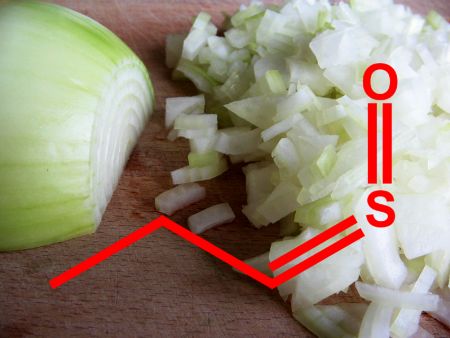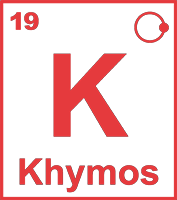
When chopping onions, propanethial-S-oxide is liberated. If this compound is not a chemical, what is it then?
There are many misconceptions about chemicals, and one of the most common ones is that food should be “free” of chemicals. For example, in the article “The future of cuisine?” the journalist writes:
“… the ingredients used in molecular cooking are natural, free of chemicals…”
Most of the hydrocolloids used in molecular gastronomy are certainly of natural origin, I don’t disagree about that. But “free of chemicals” is ridiculous… All ingredients used in the kitchen are chemicals (in a broad sense), albeit some very complex and not always very pure onces!
One of my motivations for being involved with molecular gastronomy and popular food science is to promote the understanding that all food is made up of atoms and molecules. Therefore I would like to present to you the organisation Sense about science which tries to combat common chemical misconceptions. According to their site which is well worth a visit they “promote good science and evidence for the public”. As a chemist I found the section Making sense of chemical stories particularily interesting. I think the report Misconceptions about chemicals (downloadable pdf) should be downloaded and read by every journalist writing a story about molecular gastronomy (or any other everyday science topic for that sake). And I think it should be quite interesting for the readers of this blog as well. Here’s a short summary:
You can lead a chemical-free life
The chemical reality is that you cannot lead a chemical-free life, because everything is made of chemicals. Chemicals are substances and chemistry is the science of substances – their structure, their properties and the reactions which change them into other substances. Claims that products are “chemical free” are untrue. There are no alternatives to chemicals, just choices about which chemicals to use and how they are made.Man-made chemicals are inherently dangerous
The chemical reality is that whether a substance is manufactured by people, copied from nature, or extracted directly from nature, tells us nothing much at all about its properties. In terms of chemical safety, “industrial”, “synthetic”, “artificial” and “man-made” do not necessarily mean damaging and “natural” does not necessarily mean better.Synthetic chemicals are causing many cancers and other diseases
The chemical reality is that many of the claims about chemicals being “˜linked’ to diseases simply tell us that that a chemical was present when an effect occurred, rather than showing that the chemical causes the effect. Caution is needed in reporting apparent correlations: it is in the nature of scientific experiments that many disappear when a further test is done or they turn out to be explained in other ways.Our exposure to a cocktail of chemicals is a ticking time-bomb
The chemical reality is that, although the language of “cocktails” and “time bombs” is alarming, neither the presence of chemicals nor the bioaccumulation of them, in themselves, mean that harm is being done. We have always been exposed to many different substances, because nature is a “cocktail of chemicals”. Modern technology enables us to detect miniscule amounts of substances, but the presence of such a small amount of a specific substance does not mean that it is having any discernible effect on us or on future generations.It is beneficial to avoid man-made chemicals
The chemical reality is that, insofar as there is a “˜need’ for anything, synthesised and man-made chemicals have given societies choices beyond measure about what they are exposed to and the problems they can solve.We are subjects in an unregulated, uncontrolled experiment
The chemical reality is that there is an extensive regulatory system that strictly controls what chemicals can be introduced: what experiments can take place, what can be used, for which purpose and how they should be transported, used and disposed of.
Apart from the “free of chemicals” misconception there is the whole natural/organic vs. synthetic/conventional food debate. But I think I’ll leave that for a separate post.
Update: Several commenters below have pointed out that Sense about science is funded by various lobby groups. An article by George Monbiot explores this in great detail. It’s OK to be aware of this, but I still feel their statements regarding “Misconceptions about chemicals” are very much to the point and well worth reading.
[“Sense about science” was found via The Sceptical Chymist. Thanks!]

good post – this is the sort of thing that needs to be said in public more often. but you might want to double check that structure
Great post. I went to grad school in California, and the law there was that businesses had to post signs warning of known carcinogens. The signs usually said something like, “This building contains chemicals known to the state of California to cause cancer.” My friend’s apartment building had such a sign in the laundry area, and they didn’t quite get it: It said, “This building contains chemicals.”
Along the same lines, I then worked for a defense contractor, and received a new safety handbook that I had to read and acknowledge. It required that we notify our manager if we believed we were exposed to “radiation of any kind.” I promptly emailed my manager, informing him of the requirement, and telling him that I was being exposed to EM radiation in the visible part of the spectrum (from the office lights), and from roughly 300 kelvin blackbody radiation.
The domain name belongs to Tracey Brown, London, UK. A bit of googling returns this: http://www.lobbywatch.org/profile1.asp?PrId=143
“Tracey Brown is the Director of the pro-GM lobby group Sense about Science . […] Brown’s analysis is precisely that of the LM network who claim that as, in their opinion, there is no empirical information to show that GM foods are dangerous, the job of government, scientists and business is to defend the technology and the importance of innovation and experimentation which are the basis of progress.”
In other words, she’s trying to propagate the idea that genetically modified organisms are not harmfull, an issue that has been debated many times and never solved. The protocols of experimental supposed to show the inocuity of GMOs were quite doubtful (as well as the ones trying to show the opposite). Let’s put it this way: the website is not aimed at explaining to the general public that life is made of chemicals, but to promote GMOs.
To go back to the original topic, I’ve also heard Hervé This trying to explain on the French radio that cooking is essentially chemical and that it doesn’t make sense to try to separate “natural products” and “chemical products”. Its’ one of his current crusades, along with “science is not evil, it doesn’t kill”).
But what must be made very clear to everyone IMHO is that the important factor is the *amount* of chemicals you ingest, and their concentration in your body. Water can kill you if you drink too much of it (something like 8 L) in a short period of time. And you don’t die if you ingest (very) small amounts of tetrodotoxin.
But the average citizen has no way to measure what amount of which chemicals he absorbs every day in his food (and this includes salt, sugar, soy lecithin, trans-fatty acids, preservatives, pesticide residues, you name it). Therefore the average citizen has no idea what he is actually eating, and what effect it will have on his health, especially in the long term. But on the other hand, he already has noticed that when using industrial food, he can’t escape some chemicals which are forced upon him by the industry (it’s not about being treated as a guinea pig, but simply that these chemicals are handy for preparing cheaper food, and that seems nowadays more important than taste, quality or healthiness).
What do these people thing happens when they fry a steak or peel a potato? Of course there are chemical reactions happening constantly while we cook, but these are chemical changes that occur naturally in our foods. The use of chemicals in genetic modification and such are much the subject of concern, mainly because they are issues that can be understood by and argued by the masses.
Kiwi,
One can draw resonance structures of propanethial-S-oxide, but for the illustration I decided to only use one of the structures:
CH3-CH2-CH=S=O CH3-CH2-CH=S(+)-O(-)
Matthieu,
Thanks for the information about the the owner of the domain! I was not aware of this. It’s important to bear this in mind when visiting the site. Knowing this I would take all the information provided about GM foods with a pinch of salt. However, I still fell that the discussions of chemical misconceptions is very good. You also make a good point about toxcicity: it’s not the chemical itself but the dose that kills!
Haha, great post. Loved the comment about the radiation notice
Along with the radiation story, a biochemist friend of mine was telling me that potassium is radioactive enough that bananas can be detected with a Geiger counter, and shipping containers full of them are causing tons of false alarms at our ports. And yet my friends look at me like I’m crazy when I wonder aloud when our supermarket will finally start carrying irradiated eggs.
Great!! I am always trying to explain people things like those, but they always prefer the alarms in the green section of the Sunday supplement of the newspaper (very scientific)
You might want to rethink promoting Sense about Science. Do a bit of googling, and you’ll find that behind the reasonable sounding website is a less than sound history. They are basically a biotech corporation funded lobby group. This doesn’t mean they are bad, but yI’d encourage you to look a little deeper.
George Monbiot’s article in the Guardian is one place to start: l